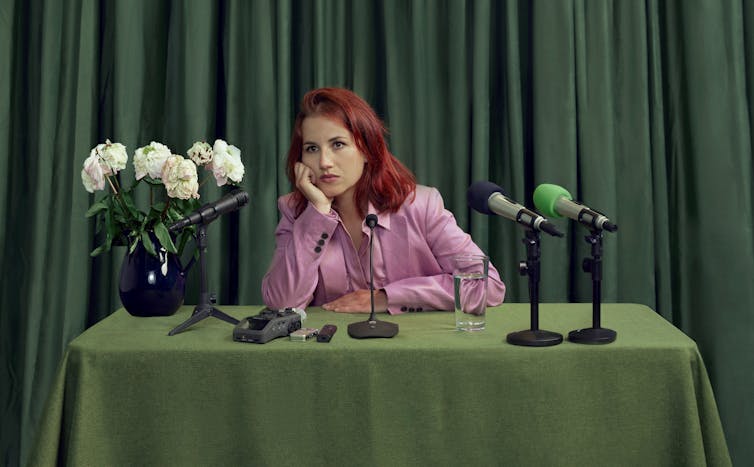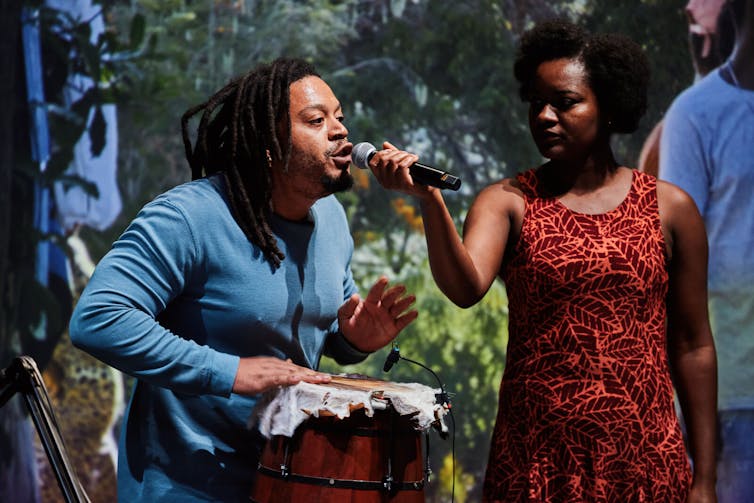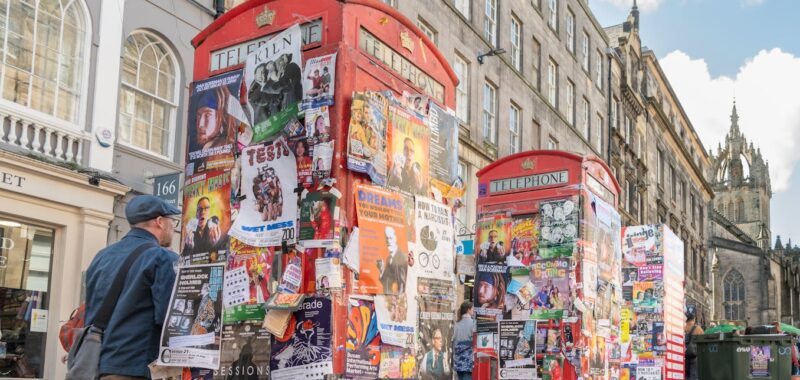The Edinburgh International and Fringe festivals 2024 have come to close. With more than 3,000 shows being performed, no one person could ever have seen them all, but as a maker and critic of political theatre I was most interested in finding performances that said something significant about our world today – and I wasn’t disappointed. From climate anxiety to Gaza and the culture wars, here are some of the most talked-about shows and themes from the festival.
1. Climate
In my roundup of last year’s Fringe offerings, I lamented the shortage of plays about the climate. Happily, this year has been a different story.
Many shows explored related issues, including a play about climate activism (Me For You), a stand-up show about eco-activism (Stuart Goldsmith: Spoilers) and a multimedia concert on the climate crisis (The Seas Are Rising: Stories of a Climate in Crisis). But two shows stood out from the rest.
First, a co-production of the Daisy Hall play Bellringers by Atticist, Ellie Keel Productions and Hampstead Theatre. A lyrical and subtly surreal vision of two bell-ringers living in the ruins of climate breakdown, Jessica Lazar’s stylish production will be at Hampstead Theatre later this year for those who missed it this time around.
Second, performance artist Tom Bailey’s show Vigil, is a poetic exploration of the ruins left by biodiversity collapse and climate change. In a devastating production, Bailey attempts to perform as 26,000 endangered species in under an hour. Bailey will be performing the sequel to this production at the Greenwich and Docklands International Festival this weekend.

Mechanimal
2. Gaza
Understandably, a number of shows at this year’s Fringe responded to the ongoing genocide in Gaza. This included two previously performed fringe shows about Palestine revived for the festival.
The Shroud Maker, written and directed by Palestinian theatre maker Ahmed Masoud in 2018, is a darkly comic meditation about an 80-year-old Palestinian woman making shrouds for the dead. Meanwhile Khawla Ibraheem and Oliver Butler’s A Knock on the Roof, originally performed in 2015, presents an unexpectedly comic account of a Gazan woman’s efforts to avoid aerial bombardments.
Meanwhile, Nadav Burstein’s new play Rebels and Patriots, offered a starkly different perspective. Produced by the Israeli-Palestinian British theatre company Floating Shed, it tells the story of four Israel Defense Forces conscripts who experience, in different ways, the devastating psychological impact of war.
Elsewhere Nick Cassenbaum’s two-hander comedy heist, REVENGE: After the Levoyah, while not directly about Gaza, shed light on the subject by tackling antisemitism. Imagining a kidnap attempt on former Labour leader Jeremy Corbyn, REVENGE offers an unexpectedly light-hearted exploration of the difficulties wrought by inter-generational trauma within the Jewish community.
3. Protest
This year also saw a number of shows exploring themes of protest and revolution.
Lessons on Revolution is a meditative piece of documentary theatre about the 1968 student occupation of London School of Economics (LSE). Combining verbatim and multimedia performance, it revives the story of Marshall Bloom’s refusal to tolerate LSE’s alleged complicity in Ian Smith’s racist regime in what was then Rhodesia (now Zimbabwe), asking in the process what lessons might be taken from this today.
Apphia Campbell’s Through the Mud, meanwhile, chronicles the lives of two women: Assata Shakur, who was a member of the Black Liberation Army in the US in the 1970s, and a young woman involved in the Black Lives Matter movement in 2014. Bringing together blues and performance, Through the Mud offers a harrowing but ultimately galvanising insight into the ongoing fight for black liberation in America.

This Egg
4. Gender
As last year, the impact of the ongoing cultural wars on the transgender community has been a significant recurring theme in works contrarily celebrating trans resistance. Two shows stood out for their exploration of these themes.
Ugly Sisters by Charli Cowgill and Laurie Ward, explores an interaction between Germaine Greer and a trans woman that took place shortly after the publication of The Female Eunuch in 1970. Through drag and dance, Cowgill and Ward offer a provocative but also surprisingly sympathetic insight into the world of gender-critical feminism. This show has a post-festival run at the New Diorama in September.
TESTO is a one-person show based on interviews with people who have taken testosterone during the process of gender transitioning. Combining lip-sync, verbatim theatre and movement to explore bodily autonomy, it’s a lurid and labyrinthine journey into the experience of transitioning.
Beyond this, a number of shows explored the theme of gender more widely. Josie Dale-Jones’s A Little Inquest Into What We Are All Doing Here explores the censorious nature of contemporary discourse on sex and gender issues. Show Pony is a high-octane show about gender and ageing, in which three performers reflect on the discrimination experienced by women working in the circus industry. And Furiozo: Man Looking for Trouble is a ferocious and highly entertaining clown show about toxic masculinity and rage.

Andrew Perry
5. A global festival
Lastly, as befits an international festival of this nature, a number of shows offered insights into other struggles and conflicts across the globe. Two in particular stood out.
First, director Christiane Jatahy’s return to the Edinburgh International Festival with After the Silence, based on Itamar Vieira Junior’s novel Torto Arado (2019). Jatahy’s production weaves a tapestry of film, performance and music to portray bitter struggles around the fight for land, slavery’s legacy and structural racism in Brazil.
Lastly, food writer Atoosa Sepehr’s show My English Persian Kitchen tells the story of an Iranian woman escaping an abusive husband before arriving in the UK, in the process exploring continuing struggles around gender inequality in Iran. Sepehr’s play will be on at the Soho Theatre in September and October.

Looking for something good? Cut through the noise with a carefully curated selection of the latest releases, live events and exhibitions, straight to your inbox every fortnight, on Fridays. Sign up here.

